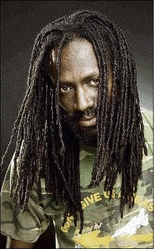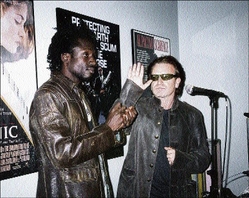The Abdel Wright story - Part 2
Published: Wednesday | May 20, 2009


Singer Abdel Wright says he will not allow anyone to determine his musical path. - Contributed
Abdel Wright, a talented, self-taught singer/songwriter/guitarist, spent five years in prison from 1996-2001 for illegal possession of firearm and robbery with aggravation. After his release, he struggled for years, trying to find his place in the musical universe.
From the onset, his non-reggae acoustics did not endear him to the Jamaican music industry. His funky tone was described as being too white.
Exotic music
"My type o' music kinda exotic to them. Dem like it, but dem no know what to do with it. And mi couldn't wait pon dem!" Wright told His Story.
Fortune came knocking on his door when music producer Brian Jobson, of No Doubt fame, introduced him to Dave Stewart of Eurythmics. He was also introduced to Bono of U2 and Jimmy Iovine of Interscope Records. They liked his sound and profile and decided to produce his debut album, which was released in August 2005 by Interscope Records on Stewart's Weapons of Mass Entertainment imprint.
The CD got rave reviews in the United States, Canada and Japan, but months after it was released, Wright found himself once again on the wrong side of the law. He was jailed in November 2005 for illegal possession of firearm. Released from prison in June last year, he now has his sights set on entering the music industry in Europe, not Jamaica nor the United States.
Prior to his run-in with the law and shortly after the release of the album, which is still being sold on Amazon.com, he had been dropped by Interscope. The distributors couldn't contain the rebel.
"Mi revolutionary music kinda affect them too, because CIA did come check me out and dem ting deh too ... . Somebody from Universal Music come to mi and say Americans don't like to be told the truth, they like to be entertained," he claimed.
Free-spirited
Wright, the free-spirited, straight-talking Bohemian, was not prepared to sugar-coat his lyrics and get a makeover. Moreover, he was no 'Mr Romantic', singing bubble-gum pop songs. He wanted to use his music to expose inequity and oppression, to convey social commentary. His handlers, he said, could not deal with that.
Wright said he is not in music for stardom and fame per se. He said he is doing what he loves, being the voice for the voiceless, and so the glamour of stardom is not high on his agenda.
"Dem want mi pop style when mi can wear one tight pants like Lenny Kravitz ... . Dem want to put mi in a little box. Dem no dress mi, dem no do nutten to mi. Me dress myself, me do mi own ting. Mi don't even want dem limousine drive. So dem find me subversive to dem criteria," he told His Story. Also, he said Interscope didn't have the publishing rights for his songs.
But image-altering issues aside, to people who might say he blew his chances as it relates to his second gun-possession conviction, he said, "The only time you blow something a when you dead, but once mi get a buss and mi blew, it mean say mi did mek a mark. So all mi need fi do is continue the mark. Mi give thanks fi get a likkle taste a it. (And) sometimes God have a way fi work out things."
Working things out seems to be a constant in Wright's life. His father disappeared before he was born to a mother who was mentally ill. When the authorities went to take him, at nine months old, from his mother, she tried to hide him He was taken to Hanbury Children's Home in Mandeville, Manchester, where he stayed until he was seven.
At the residential church, he was fascinated with playing the harmonica, but according to him, he wasn't allowed to play them because he was a "bad boy". One day he found a broken harmonica in the garbage, cleaned it up, found a quiet spot and played Jesus Loves Me. Unknown to him, the manager of the home heard him and applauded. He was subsequently given an unbroken harmonica, and thus began his love affair with music.
Having been transferred to Summerfield Boys' Home in Chapelton, Clarendon, when he was about nine, he realised that some of the children at the home and those at school had parents. He began to seriously wonder about his relatives and his existence. He wanted answers, so he broke into the office at the home, found his file, and learned of his mother's name and address. Two weeks after the discovery, he set out to find her.
THE STRUGLE
The money he saved from selling bottles was his bus fare. He took a bus to May Pen, and another from May Pen to Kingston, where he ran out of money. A woman gave him some coins, after which he jumped on to a bus to St Thomas. There, he found himself in the Morant Bay market. While feeding on raw cabbage, he said he was held by a caretaker, who took him to the police. He was beaten and thrown him into a cell for women, Wright recounted.
After two days in the cell, child-care officers took him to see his mother in Trinityville, St Thomas, but she was so detached from reality that she did not communicate with him. From there he was taken to a reformatory school in Stony Hill, St Andrew. Then it was on to Alpha Boys' Home, where his singing talent was recognised by a Miss Campbell. When Campbell left Alpha, he left too and found her home.
He stayed with her for a while, but she turned him over to the SOS Children's Village in Stony Hill, where his life became tumultuous. "Mi get bad. Mi mussi bruck the post office inna Stony Hill in front o' the police station 'bout three times, 'bout mi a look fi letter whey sumady write me ... ," he recalled.
Imprisonment
Wright was later thrown out of SOS. He got involved in crime and was imprisoned.
The music is still very much with him, but he said he's yet to reach his summit. However, he's not wallowing in self-pity, he said; nor is he relenting in his effort to showcase his style of music.
"You work at you music. Don't mek nutten hold you down and mek yuh 'fraid. Somebody haffi tell the truth.
"Imagine all a we inna we music, inna we writing nah say the full truth ... . How people a go get the real help. Somebody haffi go put dem head pon de block, and mi a goh do it," Wright declared militantly.
paul.williams@gleanerjm.com

Abdel Wright shares the microphone with international artiste Bono of U2. - contributed








